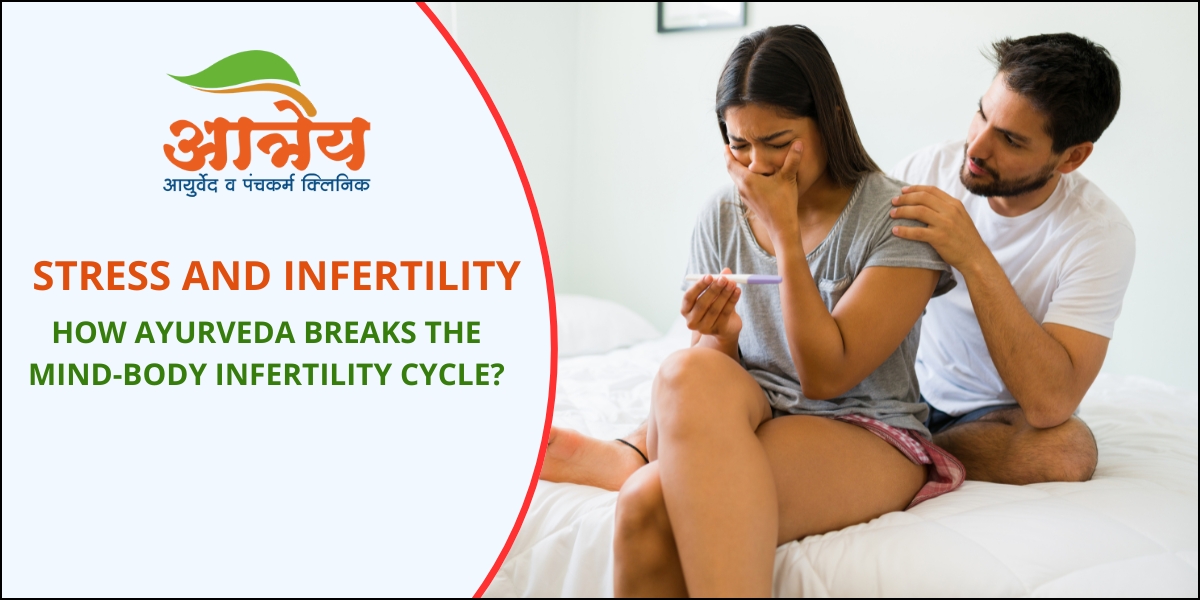Infertility is not just a physical challenge — it’s an emotional one too. Stress, anxiety, and constant pressure to conceive can deeply affect hormonal health, ovulation, and sperm quality. Modern research now confirms what Ayurveda has always known: the mind and body are deeply interconnected, and emotional imbalance can lead to physical disorders, including infertility.
Ayurveda’s holistic approach recognizes that mental calmness (Satva) is equally vital as physical health. By balancing body, mind, and soul, Ayurveda helps break the stress–infertility cycle naturally.
The Science Behind Stress and Infertility
When you are under chronic stress:
- The brain releases excessive cortisol and adrenaline, which disrupt the balance of fertility hormones like FSH, LH, estrogen, and progesterone.
- Women may experience irregular periods, anovulation, or delayed conception.
- Men may face reduced sperm count, low motility, and decreased libido.
Over time, stress weakens Agni (digestive fire), accumulates Ama (toxins), and disturbs Vata dosha, leading to irregular reproductive functions.
Ayurvedic Understanding of Stress-Induced Infertility
Ayurveda considers the mind (Manas) as a part of the body’s internal system.
- Excessive stress causes Vata aggravation, leading to irregular cycles and sperm dysfunction.
- Pitta imbalance creates hormonal fluctuations and emotional irritability.
- Kapha dominance leads to lethargy and reduced metabolic fire.
Ayurveda thus treats infertility not only through herbs and Panchakarma but also by restoring mental harmony and Satvaguna (emotional stability).
Ayurvedic Solutions to Break the Stress–Infertility Cycle
1. Panchakarma Detoxification
Stress leads to toxin accumulation and blocked energy flow.
- Shirodhara – continuous pouring of medicated oil on the forehead calms the nervous system.
- Abhyanga – full-body massage with warm oil reduces Vata imbalance.
- Basti – nourishes reproductive tissues and relaxes the mind-body axis.
(These therapies should be taken under expert supervision.)
2. Mind-Calming Lifestyle Routine
- Sleep early and wake up before sunrise.
- Avoid overworking, late nights, and excessive screen exposure.
- Start mornings with self-massage (Abhyanga), light yoga, and meditation.
- Include Satvik activities like nature walks, deep breathing, or listening to soft music.
3. Diet to Calm the Mind & Support Fertility
- Include: ghee, milk, almonds, walnuts, bananas, and pomegranate.
- Avoid: caffeine, cold drinks, spicy and oily food.
- Eat in a relaxed environment and chew food slowly.
4. Ayurvedic Herbs (under expert guidance only)
- Ashwagandha
- Brahmi
- Shatavari
- Jatamansi
Ayurveda beautifully bridges the connection between mind, body, and fertility. Stress creates imbalance, but relaxation and mindfulness restore natural rhythm. Through therapies like Panchakarma, meditation, diet, and lifestyle correction, Ayurveda helps couples heal emotionally and physically — preparing the body and mind for natural conception.
For a personalized Ayurvedic fertility and stress management plan, contact Aatreya Ayurved Clinic at 9860007992.
FAQs on Stress & Infertility
Q1. Can stress really cause infertility?
Yes. Chronic stress alters hormone levels and affects ovulation and sperm production, reducing the chances of conception.
Q2. How does Ayurveda reduce stress naturally?
Through Panchakarma, meditation, balanced diet, and mind-calming therapies like Shirodhara and Abhyanga, Ayurveda reduces stress and restores harmony.
Q3. Can Ayurvedic treatment help alongside IVF or IUI?
Yes. Ayurveda improves the body’s natural receptivity and calms the mind, often improving IVF/IUI success rates.
Q4. How long does it take to overcome stress-related infertility with Ayurveda?
Most couples experience emotional and physical improvement within 2–4 months, depending on individual conditions.
Q5. Is meditation really necessary for fertility?
Yes. Meditation reduces cortisol levels, promotes hormonal balance, and enhances positive energy essential for conception.







